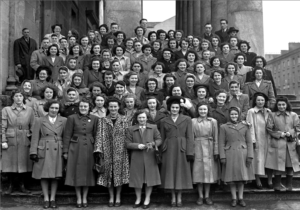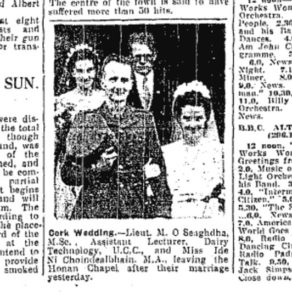The first Cork camogie club was founded in 1905. and took the name of Fáinne an Lae. Sean Ó Coindealbháin (Conlon) coached the team in the basics of the game; his sisters Kate and Margaret Conlon and cousin, Christina Conlon also played.
Sean’s daughter, Íde Conlon (or Ní Choindealbháin), who later became Íde Bean Uí Shé, was born in 1916. Íde Conlon received her primary education at St Aloysuis school, Cork. Her mother died when she was 12 years old, and her father sent her to Dublin where she received her secondary education from the Dominican Nuns at Eccles St. She then studied at UCC and was awarded an M.A.in Irish in 1939.
There are no records of Íde Conlon playing for UCC in the inter-varsity competition, the Ashbourne Cup, but she did play with UCC in 1938 and 1939 in the Cork Championship. She remained a member of the UCC club for the rest of her life.
The All-Ireland Inter-County Camogie Championship began in 1932, in the same year that Cork established its County Board. Many of the officers were male.
The 1930s saw a mixture of success and strife for Cork camogie. A mix up in administration saw Cork fail to enter the first All-Ireland Camogie Championship in 1932. In 1933 the majority of Cork clubs refused to impose a ban on foreign games and the clubs which supported the ban broke away and formed their own board for a short while.
In 1934, the Camogie Association imposed a national ban on foreign games, similar to that of the G.A.A. This reduced the strength of Dublin in particular, and helped Cork to win the All-Ireland titles of 1934, ’35 and ’36.
The ban caused trouble for Cork too when in 1937, a player from the Cara Cliodhna Club was suspended for playing Hockey. This led to the whole team leaving Camogie and taking up Hockey instead. Finance was also an ongoing troublesome issue for the Camogie Board. By 1939 the Board was so broke that Cork’s opponents Louth, paid for Cork to travel to Louth for the All-Ireland semi-final. Cork later won the All-Ireland title.
In 1940, Íde Conlon, was elected Registrar of the Board. She had a reputation for wearing the latest fashion styles and carried that style into her everyday life. It is said she always wrote with a “feathered pen” and the colour of the feather would change to match the colour of her coat or top.
In 1942, Lil Kirby, the Cork Chairperson and intercounty team member, was elected President of the Camogie Association. She also married and moved to Bandon to live during that year. Her Camogie Club, Old Als, had a ban on playing married players (a ban which lasted until 1968) so marriage meant that she had to retire from playing. Travelling from Bandon to Cork regularly during the emergency and ration year proved an arduous task, so she stepped down as Chairperson of Cork at the end of the year.
Íde Conlon also married in 1942. Lieut. Michael O’Shea was a lecturer in Dairy Science at UCC and upon marrying, Íde Conlon became Íde Bean Uí Shé. She was then elected Chairperson in place of Lil Kirby.
Her first year as Chairperson was dogged by the troublesome financial matters that occupied the Board’s mind. Bean Uí Shé did manage to put positive policies in place. She used her old Dublin connections to organise a game between a Cork Schools selection and Dublin Schools selection an event which became an annual affair until the Second Level All-Ireland Championship began in 1969.
Bean Uí Shé fervently believed that there was no need for a male involvement in the affairs of the Camogie Association. It was her opinion that women were capable of managing their own affairs not just in Camogie but in life in general. She showed that she was prepared to put her beliefs into action at her first convention as Chairperson at the end of the 1943 season. Liam Dynan, the outgoing secretary was opposed by Alice Quigley. The vote ended in a tie, and Íde Bean Uí Shé used her casting vote in favour of Alice Quigley.
With Alice Quigley installed as secretary, Íde Bean Uí Shé began her reform. Firstly, she revamped the Schools Board and recruited school girls as Schools Board Officers. Allowing the girls to organise the games and affairs of the Board under her guidance.
She was mindful no doubt of the haemorrhage of effective officers, like Lil Kirby, because of marriage and family commitments. The Schools Board introduced hundreds of girls to the game, while also providing a steady stream of trained officer material for the Adult Board and the clubs.
Also, in 1944, at a meeting to reform the Munster Camogie Council, she refused to pay Cork’s affiliation fees until a number of demands, which included that there would be no male officers, were met. The demands were denied and Cork was excluded from the Munster Championship.
At the next County Board meeting Uí Shé said, “Missing out on a Championship season (to achieve an all-female leadership) was a small price to pay.” It would be eight years before Cork would participate in the Munster and All-Ireland Championships again. At the end of year, the Board put forward a motion for Congress stating, “That no man hold an official position in the association.”
The Camogie Congress of 1945 did not appreciate the trouble Cork was causing. National Secretary Jean McHugh reported the Association had twice as many meetings as normal because of “the affair in Cork”.
Íde Bean Uí Shé would not budge from her beliefs and quoted Pope Pius XII to back up her case. “our Holy Father the Pope (Pope Pius XII) has …called on Catholic women to take a greater interest in public affairs and to take a more active part in their administration.”
Even though Cork were not playing at intercounty level, within the county interest in playing Camogie was growing rapidly. At the end of 1946, the number of clubs had risen to 60 (up from 19 in 1944).
In 1947 Imokilly, won the County Senior Championship with a win over Lee Hosiery in the final. It was a watershed final. Imokilly became the first divisional side to win the championship, and Lee Hosiery became the last factory team to reach a final. The newly formed Blackrock club won the senior championship in its first year in 1948 and Glen Rovers won its first championship in 1950.

Ide Bean Uí Shé stepped down as Chairman in 1950. She was elected Board President for life, and remained as a mentor to the Schools Board.
In January 1951 a motion to the Cork convention asked for Cork to re-join the intercounty scene. There were moves towards unity from the Camogie Association too. The Secretary, Jean McHugh stated in her annual report, “the all-important County of Cork remains outside the control of our organisation”. Cork was needed nationally. Cork entered the Munster Championship in 1952 and won the Munster title; The first in nine years. Cork lost to Antrim in the All-Ireland semi-final.
At the Cork Convention of 1953, Íde Bean Uí Shé gave a triumphalist speech.
“The Camogie Association of Ireland has evolved from being an organisation run mainly by men to one run almost entirely by women at the present day…I am glad to say that Cork played a decisive part in this evolution.
“For some years, some of the men in key positions showed anything but a fatherly interest in the up-and-coming young women of the Association, and tried to keep them submissive and obedient … However, in modern Ireland, it is evident that women are now able to run their own associations efficiently…”
Ide Bean Uí Shé, as Board President continued to speak at the Annual Conventions for many years. In 1969, when a motion was proposed to allow the re-admittance of men to the County Board, she met it with a broadside.
“Since 1922, women have been allocated a certain role in Irish life. The day is gone when Ireland’s destiny can be decided by men alone, and in this year of the celebrating the jubilee of the first Dáil sitting, surely is a retrograde step…”
She also spoke on the other topic of the day in Camogie; the dress code for players. Players wanted change from the traditional gym frock worn by Camogie teams. Ever the keen eye for fashion, Bean Uí Shé said,
“…perhaps with the advent of the mini-skirt… Central Council should consider holding a fashion competition among players to pick a young designer to fashion a new uniform.”
She made a brief return to the Cork Camogie Board as an officer in the late 1970s. She was Vice-chairman in 1977, Registrar in 1978 and Treasurer in 1979. By then her health was failing badly, and she withdrew from public life. She died on March 23 1986 and was survived by her sons Cian and Colm.
Among Bean Uí Shé’s legacy is that she began a debate on the role of women in camogie, and in society in general. She led her generation of women towards taking control of their own affairs.
Cork did not win the All-Ireland Camogie title between 1941 and 1970, chiefly because of Dublin’s dominance in winning 18 All-Ireland titles in 19 years between 1948 and 1967. Since 1970 however, Cork has won 22 titles.
While Camogie has been overtaken in popularity by Ladies Football. It is likely, within the next few years, that Camogie, Ladies Football and the G.A.A. will merge into a new super-Gaelic Games Association. Camogie will then be stronger financially and in terms of facilities. The price for this merger will be that autonomy may be lost, and the influence of men on the affairs of camogie may once again be a feature. Would Íde Bean Uí Shé have been upset about this, or would she have declared, as she did in 1944, “It’s a small price to pay”? Her speeches over the years would suggest she may well have chosen the latter.

That is my late aunt – quite a character
My mother, Bernie Cashman, knew Ide very well. She’s also in that photo, third row from the bottom, 4th in from the left. I can’t believe she’s in it. What great women they were back then.